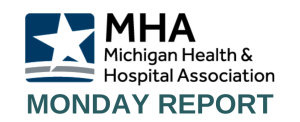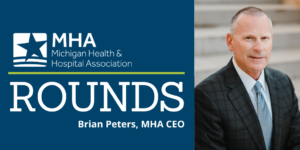The Centers for Medicare & Medicaid Services (CMS) recently released a proposed rule to update the Medicare fee-for-service (FFS) hospital inpatient prospective payment system (IPPS) for fiscal year (FY) 2025.
The rule proposes to:
- Increase the standard operating rate by a net 2.6%, after budget neutrality adjustments, from $6,497.77 to $6,666.10, for hospitals that successfully comply with the CMS quality reporting program and electronic health record requirements. Hospitals that do not meet requirements for these programs are subject to a lower annual update.
- Increase the federal capital rate by 2.5%, from $503.83 to $516.41.
- Increase the cost outlier threshold by 15%, from $42,750, to $49,237, to maintain the target of paying 5.1% of aggregate IPPS payments as outlier. This will result in fewer cases qualifying for an outlier payment.
- Update core based statistical areas as a result of the new Office of Management and Budget labor market delineations based on the 2020 Decennial Census.
- Implement a separate IPPS payment for small, independent hospitals, defined as those with 100 or fewer beds that are not part of a chain organization, to voluntarily establish and maintain a six-month buffer stock of one or more of 86 essential medicines.
- Create 10 new Medicare Severity Diagnosis Related Groups (MS-DRGs) and delete three MS-DRGs, most of which are within Major Diagnostic Category 08 (Diseases of the Musculoskeletal System and Connective Tissue) and specific to interbody spinal fusion devices.
- Establish a new mandatory CMS Innovation Center model that would provide bundled payment for certain surgical procedures.
- Use FY 2019, 2020 and 2021 Worksheet S-10 uncompensated care cost (UCC) data for the UCC pool allocation, which comprises 75% of Medicare disproportionate share hospital payments.
- Add seven new measures, primarily focused on patient safety-related practices and outcomes, to the inpatient quality reporting program. Also remove five measures and modify two existing measures, including the Hospital Consumer Assessment for Healthcare Providers and Systems survey measure.
- Increase the number of mandatory electronic clinical quality measures that hospitals must report for both the IQR and the Promoting Interoperability programs.
- Require weekly reporting by hospitals, including critical access hospitals, of acute respiratory illness data beginning Oct. 1, 2024, on confirmed infection of COVID-19, influenza and respiratory syntactical virus among hospitalized patients, hospital capacity and limited patient demographic information, including age.
- Change severity level designation for Z codes describing inadequate housing and housing instability from non-complication or comorbidity to complication or comorbidity for FY 2025.
- Solicit input through requests for Information on:
- Hospital resource usage for providing inpatient pregnancy and childbirth services to Medicare patients compared to non-Medicare patients.
- Requirements and structure should be for a possible future obstetrical services conditions of participation.
The MHA continues its review of the proposed rule and will provide hospitals with an estimated impact analysis in the next few weeks. The MHA encourages hospitals to review the rule and submit comments to the CMS by June 10 and to notify the MHA regarding issues identified by May 24.
Members with questions should contact Vickie Kunz at the MHA.


 Executive Budget Supports Healthcare, Other Legislative Action
Executive Budget Supports Healthcare, Other Legislative Action MHA CEO Report — The State of Healthcare
MHA CEO Report — The State of Healthcare Registration Open for 2024 Healthcare Leadership Academy
Registration Open for 2024 Healthcare Leadership Academy The Three In-bound Truth Bombs set to Explode in U.S. Healthcare
The Three In-bound Truth Bombs set to Explode in U.S. Healthcare